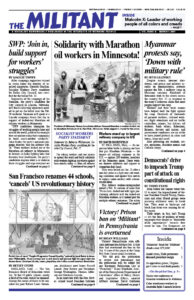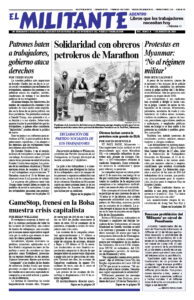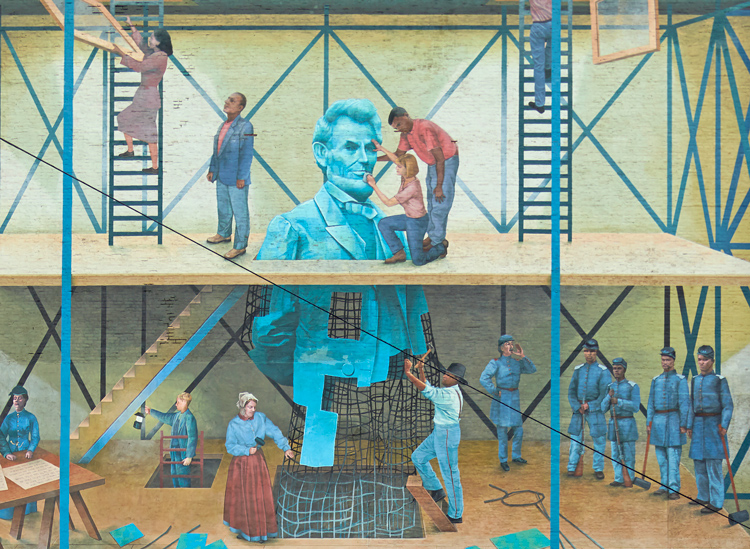OAKLAND, Calif. — The San Francisco Board of Education voted Jan. 26 that 44 public schools, nearly a third of the total, would be renamed. Among the names of those to be canceled are poet Robert Louis Stevenson, abolitionist poet James Russell Lowell, Paul Revere and Presidents George Washington, Thomas Jefferson and Abraham Lincoln.
In an interview with the New Yorker, school board President Gabriela López made clear the board’s view that race is essential to understanding U.S. history and politics today, not the class divisions that actually underlie all exploitation and oppression.
She said the people whose names were removed were guilty of “white supremacy, racism, colonialization, ties to slavery, the killing of indigenous peoples or any symbols that embodied that.”
Paul Revere, known for his role in the first American Revolution, was crossed off because he allegedly took part in an expedition against a Native American tribe. But that never happened. In the ensuing outcry against the decree, historians have objected to the board’s reliance on Wikipedia and other untrustworthy sources to determine what names should go.
Washington and Jefferson were removed because they owned slaves. Lincoln for policies toward Native Americans.
Absent was any consideration of the role played by these historical figures in the two revolutions that were turning points in U.S. history, the revolution for freedom from the rule of the British crown and the second American Revolution, the Civil War.
The war for independence was the first victorious anti-colonial revolt of the capitalist epoch. It gave an impulse to the French Revolution of 1789, a turning point in the fight against feudalism in Europe.
The Declaration of Independence of 1776, written by Jefferson, proclaimed the right to rebel against an oppressive government. The Bill of Rights, adopted after the revolution, prevents the government from restricting freedom of speech, assembly and other rights critical for the struggles being waged by working people today.
U.S. independence and the battles by the toiling population that led to the adoption of the Bill of Rights helped fuel the abolitionist movement and laid the groundwork for fighting slavery.
The second American Revolution, the Civil War of 1861-65, was also a class struggle led by the rising capitalist class. Lincoln led the forces that crushed the slavocracy, a victory paid for in blood by hundreds of thousands of workers, farmers and former slaves.
‘Woke’ moves to cancel class history
The “cancel culture” policies of the board and “woke” government officials hide the history of these struggles. That record shows us revolutions have happened before and can happen again.
After the Civil War, freed slaves helped lead the fight to establish governments of Radical Reconstruction in the South that won widespread support from workers and farmers. But these governments were then overthrown in a counterrevolution. In 1877 Northern capitalists withdrew federal troops from the South, opening the way for the reign of racist terror that imposed Jim Crow segregation. This defeat, brought about by the industrial capitalists who feared the rise of a united working class, was the worst setback ever inflicted on working people in the U.S.
It took further struggle by the Black-led working-class movement for civil rights a century later to bring down Jim Crow.
Many of those who try to eradicate the record of these struggles hold that all who are Caucasian benefit from and are responsible for Black oppression. They let the real culprit off the hook: the ruling capitalist class, which uses racism and perpetuates other forms of prejudice to divide working people. By denying that it is in the interests of workers to unite, the rulers undercut what is central to union and other working-class struggles.
The same Board of Education voted in 2019 to cover over a mural at George Washington High School that portrayed Washington’s life. During debates over that decision board members baited those who opposed destroying the mural, labeling them “white supremacists.”
Such race-baiting along with the suppression of opposing views are common among the growing meritocratic layers who administer government agencies, foundations, universities and other institutions. “Woke” politics has become, for many of them, a tool for curtailing rights and for furthering their own careers.
In the midst of the controversy over the removal of the names, the board sent a letter informing parents that schools may not open until the fall.
“The school board has mistaken priorities,” retired nurse Janet Leeper told Joel Britton, chairman of the Socialist Workers Party campaign in northern California, as he campaigned near Paul Revere Elementary School. She said she thought “children need to be in school. My grandson, who is 6, cannot sit still in front of a screen for hours each day.”
Leeper opposes the school renaming. “Students need to know history,” she said. “They need to know why the schools were named for these individuals and the significance of what they did.”
Others that SWP campaigners met agreed with her. But there are also some who say they would like names of some schools to be changed. Families of students have tried for years to rename James Denman Middle School, which was named after a school superintendent who denied Chinese students a public education.
“Workers need to know our history,” Britton told the Militant. “As SWP candidates join strike picket lines, build support for union struggles and campaign widely among working people, they get books with the history of our struggles — including the two revolutions here and in other countries — into the hands of those who need them.
“That history shows that with an effective leadership, it is possible for working people to defend our interests,” he said. “And to build a movement to replace the rule of the capitalist class with a workers and farmers government — a third revolution.”
Jeff Powers contributed to this article.


